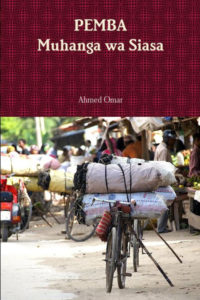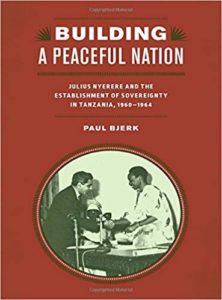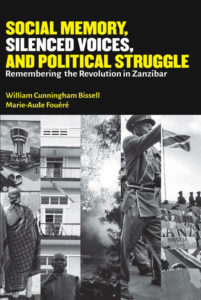Edited by Martin Walsh
SOCIAL MEMORY, SILENCED VOICES, AND POLITICAL STRUGGLE: REMEMBERING THE REVOLUTION IN ZANZIBAR. William Cunningham Bissell and Marie-Aude Fouéré (eds.). Mkuki na Nyota, Dar es Salaam, 2018. xx + 385 pp. (paperback). ISBN 978-9987-08-317-6. £28.00.
Political revolutions are, by their very nature, contested events, and liable to remain the subject of conflicting interpretations long after they have turned the existing order upside down and spun it around. This is especially so when they have been violent in their making and then evolved through further cycles of violence and repression, leaving large numbers of people dead and even more traumatised and intimidated into silence. The Zanzibar Revolution is a case in point, and this edited volume, published in association with the French Institute for Research in Africa (IFRA), grapples with collective and individual memories of the events of 12 January 1964 and their aftermath, and the continuing reverberations of these in the everyday life of Zanzibaris both home and abroad.
Social Memory, Silenced Voices, and Political Struggle begins and ends with reflections on the official commemoration of the 50th anniversary of the revolution in 2014, firstly in the editors’ thought-provoking introduction (‘Memory, media, and Mapinduzi: alternative voices of revolution, fifty years later’), latterly in a series of 15 black-and-white photographs by Ania Gruca (‘Capturing the commemoration: a documentary photo essay on the 50th anniversary of the revolution’). Anniversaries provide the islands’ government with a regular opportunity to reproduce its founding narrative, just in case its name (Serikali ya Mapinduzi ya Zanzibar, the Revolutionary Government of Zanzibar) and longstanding slogan (Mapinduzi Daima!, Revolution Forever!) weren’t reminder enough.
As the introduction makes clear, people aren’t necessarily listening, but carry their own understandings of the revolution and the events surrounding it. An increasing number of these divergent narratives have been made public in recent years, and have been pored over and debated by scholars, including some of the contributors to this collection. Although it doesn’t set out to supply a definitive account of the revolution that reconciles different views, many of the essays in this book include information that adds significantly to the critical historiography of the Zanzibar revolution and related political and social developments in the years and decades which followed the overthrow of the fledgling regime that preceded it.
Following the editor’s introduction, Roman Loimeier’s chapter (‘Memories of the revolution, patterns of interpretation of the 1964 revolution in Zanzibar’) provides an excellent overview of historical events and their different interpretation by Zanzibaris and others, including academic historians. This is followed by two fascinating chapters that illuminate important biographies: Ann Lee Grimstad’s ‘The voice of the revolution: remembering and re-envisioning Field Marshal John Okello’, and G. Thomas Burgess’s ‘Memory, liberalism, and the reconstructed self: Wolfgang Dourado and the revolution in Zanzibar’). The next two chapters provide new insights into the impacts of the revolution on marginalised island communities: Nathalie Arnold Koenings’s ‘ “For us it is what came after:”: locating Pemba in revolutionary Zanzibar’, and Makame Ali Muhajir and Garth Andrew Myers’s ‘Uncommon misery, relegated to the margins: Tumbatu and fifty years of the Zanzibar revolution’.
Gavin Macarthur (‘“Glittering skin”: race, rectitude, and wrongdoing in Zanzibar’) and Kjersti Larsen (‘Silenced voices, recaptured memories: historical imprints within a Zanzibari life-world’) both use contemporary ethnography to examine how cultural memories of the revolution are expressed and embodied in private and public practices and performance. These chapters focus on the everyday experiences of Goans and others in Zanzibar whose world was overturned by the revolution. They are followed by Nathaniel Mathews’ discussion of the transmission and transformations of traumatic memories of the revolution among Zanzibaris who fled to Oman (‘Memory, history, and the nation among the grieving cosmopolitans: Omani-Zanzibaris remember the Zanzibar Revolution, 1964-present’).
In ‘Africa Addio, the revolution, and the ambiguities of remembrance in contemporary Zanzibar’, Marie-Aude Fouéré’s explores the dissemination and reception of the notoriously racist “shockumentary” that purports to show disturbing and bloody scenes from the first week of the revolution, including bodies on the beach and mass graves. This chapter was first published in an academic journal in 2016, but is well worth a second outing. It is followed by the book’s penultimate chapter, Ahmed Rajab’s refreshingly personal reflection on ‘Healing the past, reinventing the present: from the revolution to Maridhiano’, the latter being a reference to the political reconciliation which produced a Government of National Unity in 2010-15, before the next contested election and resumption of the usual partisan hostilities.
As this summary of its contents suggests, Social Memory, Silenced Voices, and Political Struggle covers a lot of ground, and is both compelling and informative. Unlike some collections, it is well conceived, and its contributions address a set of closely interlocking themes in interestingly different ways. Although it only scratches the surface of a vast topic (Interpretation Forever!), it will surely inspire future researchers to explore further. A degree of unevenness can be forgiven, though plain-speaking readers may be put off by some of the lapses into academic gobbledygook and Swahili speakers perplexed and dismayed by the unchecked claim (repeated from another source) that the literal meaning of kishuka (“little cloth”, i.e. loincloth) is “bird shit”. But these are minor stains on the overwhelming integrity and value of this book.
Martin Walsh
Martin Walsh is an Adjunct Professor in the School of Business Studies and Humanities, Nelson Mandela African Institution of Science and Technology (NM-AIST), Arusha, Tanzania, and the Book Reviews Editor of Tanzanian Affairs.
Also noticed:
PEMBA: MUHANGA WA SIASA. Ahmed Omar. Zanzibar Daima Publishing,
Bonn, 2019. vii + 28 pp. (paperback). ISBN 978-0-359-50463-3. £18.86.

As its title suggests (Pemba: Victim of Politics), this book is a critical political history of Pemba island. The author, a biology and geography teacher from Wete, draws on his experience as a supporter of the opposition Civic United Front (CUF), interviews with other Pembans, and an eclectic variety of published sources to outline the history of the island from precolonial times to the present, with a focus on its political vicissitudes before, during and since the Zanzibar Revolution. Following a preface by the poet and publisher Mohammed Ghassani and a brief introduction, the main text is divided into 19 chapters, followed by more than four pages of references in a somewhat idiosyncratic order. The book is well produced and has a striking image of bicycles bearing sacks of charcoal on its cover. It is one of 15 works published on the enterprising Ghassani’s self-publishing platform (https://mohammedghassani.online/zanzibar-daima-publishing/) and is available from different commercial sellers.
Martin Walsh
BUILDING A PEACEFUL NATION: JULIUS NYERERE AND THE ESTABLISHMENT OF SOVEREIGNTY IN TANZANIA, 1960-1964. Paul Bjerk. University of Rochester Press, Rochester NY, 2018. xvii + 374 pp (paperback). ISBN 978-1-58046-935-7. £25.00.

This book, first published in 2015, has now been reissued as a paperback. The hardback was originally reviewed by Robert Macdonald in Tanzanian Affairs Issue 113 (https://www.tzaffairs.org/2016/01/reviews-74/) and his review is reproduced below:
The immediate tasks facing those African governments which took power of newly independent states during the 1960s were to establish political control and limit neo-colonial interference; in other words. to establish sovereignty. This was not easy. Economic and administrative capacity was limited, and creating a stable political consensus was difficult in the absence of unpopular colonial rule. To complicate matters, external threats were posed by instability in neighbouring countries and by increasingly interventionist superpower policy in the context of the Cold War. The way in which the TANU government under the leadership of Julius Nyerere was able to negotiate these challenges and create a foundational sovereignty during the period 1960-64 is the subject of this book by Paul Bjerk, an assistant professor of history at Texas Tech University.
One major limitation facing any researcher investigating post-independence Tanganyikan government policy is that many of the official records from this period remain confidential. In addition to interviewing dozens of key protagonists, Bjerk has attempted to bridge this gap by presenting the contents of a wide range of diplomatic correspondence in which key issues are often discussed frankly. Indeed, the fact that the references and bibliography in this book run to almost 100 pages is testament to his substantial archival research across several countries.
In the introduction, Bjerk states that his book is not intended to be a biography or evaluation of Nyerere. However, sections on Nyerere’s education and his development of Ujamaa ideology – and indeed the book’s subtitle – at times create a contrary impression. Although other figures such as Oscar Kambona and Rashidi Kawawa receive plenty of attention, Nyerere is firmly situated as the book’s key figure, perhaps inevitably given the central role he played in policy formation during this period.
Bjerk’s work is structured thematically, starting with a focus on domestic sovereignty. He evaluates, in turn, measures to limit the threat posed to Nyerere’s government by opposition parties and labour unions, the origins of Ujamaa ideology, early attempts at villagisation, the 1964 mutiny and, finally, the creation of the national youth service. Throughout this section, Bjerk skilfully shows that sovereignty is not simply imposed from above but rather it is the product of social mediation in which both elite and non-elite discourses play important roles.
Bjerk then turns attention to the projection of external sovereignty through foreign policy. He discusses the way in which the Tanganyikan government sought a balance between its principled positions, for example its support for independence movements in Southern Africa and its desire to maintain a non-aligned position in the Cold War. This section also contains a chapter on the Zanzibar Revolution which shows that an American intervention had been imminent before Union with Tanganyika was finally agreed.
Casual readers may find the more academically complex parts of this book off-putting, for example the theoretical sections contained in the introduction and conclusion. However, Bjerk’s work will provide an invaluable resource for those engaged in the academic study of the immediate post-independence period in both Tanzania (Tanganyika) and Africa more broadly.
Robert Macdonald
Robert Macdonald was awarded his University of Edinburgh PhD in 2018 for a dissertation on Voter Behaviour in Tanzania: A Qualitative Study of the 2015 Elections.

